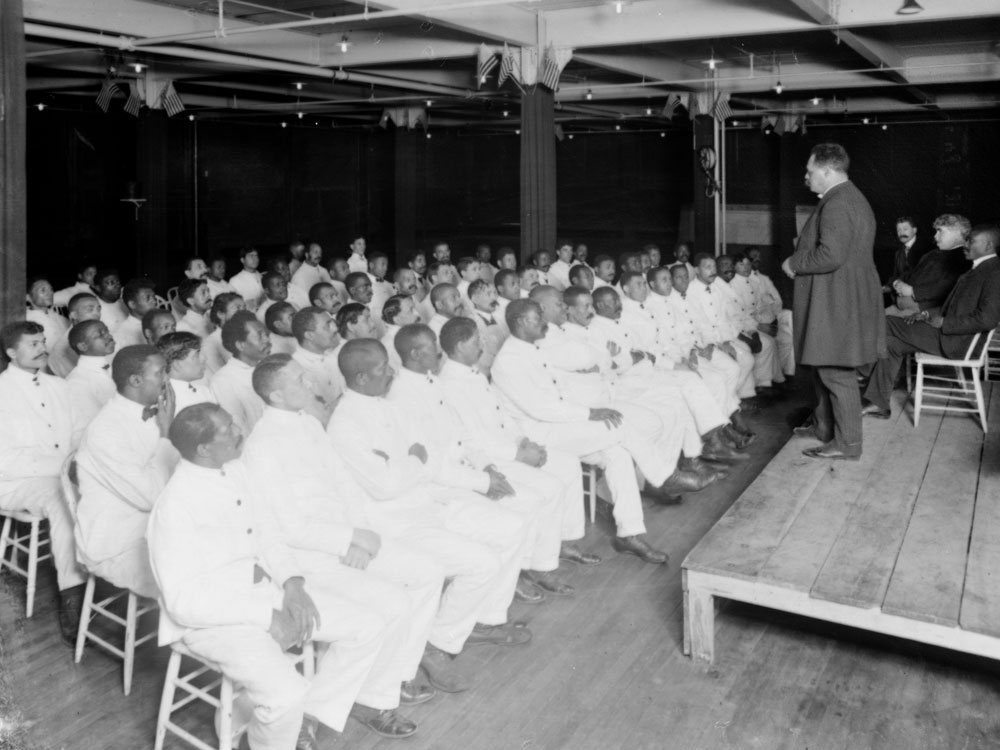On September 11, 1899, a newspaper article mentioned that Paul Laurence Dunbar worked as a janitor when he was young.
Paul Laurence Dunbar spent part of this week in Chicago, en route to Denver. Dunbar was employed a few years ago as one of a corps of thirty colored janitors in a factory at Dayton. The janitors formed a glee club, and Dunbar won his first success as a poet in writing songs for them to sing.
"Dunbar, the Poet." Cleveland Daily Leader (Cleveland, Ohio). September 11, 1899.
A few years later, another newspaper also referred to Paul's employment as a janitor.
Mr. Dunbar's ways are simple and direct. He talks of the time he was a janitor with as much freedom - and with as little boasting - as he does of the present time, when he is a poet well loved by his own people and much admired by all Americans.
"The Poet Dunbar a Chicagoan," by Elia W. Peattie. The Chicago Daily Tribune (Chicago, Illinois). September 13, 1902. Page 18.
Paul wrote an autobiographical short story about an educated Black man who sought an office job at a factory, but was offered a janitor's position instead.
He hailed a passing car that set him down at the door of the great factory which, with its improvements, its army of clerks and employees, had built up one whole section of the town. He felt especially hopeful in attacking this citadel, because they were constantly advertising for clerks and their placards plainly stated that preference would be given to graduates of the local high school. The owners were philanthropists in their way. Well, what better chance could there be before him? He had graduated there and stood well in his classes, and besides, he knew that a number of his classmates were holding good positions in the factory. So his voice was cheerful as he asked to see Mr. Stockard, who had charge of the clerical department.
"I wanted to see you about a situation."
"Oh, no, no, you don't want to see me," broke in Stockard, "you want to see the head janitor."
"But I don't want to see the head janitor. I want to see the head of the clerical department."
Mr. Stockard opened his eyes to their widest extent, and his jaw dropped. Evidently he had never come across such presumption before. "We have nothing for you," he wheezed after awhile.
Excerpt from "One Man's Fortunes," by Paul Laurence Dunbar. Published in The Strength of Gideon and Other Stories (1900).
The factory described in Paul's story is similar to the National Cash Register company in Dayton. NCR had a superintendent named Harry Stoddard, and the manager in Paul's story was Mr. Stockard. Advertisements announced that NCR hired many local graduates for clerical positions. However, company policy limited Black workers to janitorial jobs, until they were all fired in 1905 to give greater opportunity to white employees.
The National Cash Register Co. by a count made some months since, had in its employ 104 students of the Miami Commercial College including many of its prominent officers, bookkeepers and stenographers.
Advertisement. The Dayton Daily News (Dayton, Ohio). October 17, 1898. Page 8.

Janitors at National Cash Register Company, February 17, 1904. Image provided by the NCR Archive at Dayton History. NCR.1998.CD40.
Years later, Paul returned to NCR to read his poetry and was given a hero's welcome.
Paul Laurence Dunbar, who has made an international reputation as a writer of verse and poetic song, appeared before the hundreds of employees of the National Cash Register company Wednesday afternoon and gave several readings and recitations. He was enthusiastically received by the employees among whom he used to work as a member of the force of colored janitors. His first appearance at the factory in which he was a janitor several years ago, was uniquely different from his appearance when he used to wear the white suit of the janitors.
"Like Return of a Hero." The Dayton Daily News (Dayton, Ohio). January 7, 1904. Page 2.
